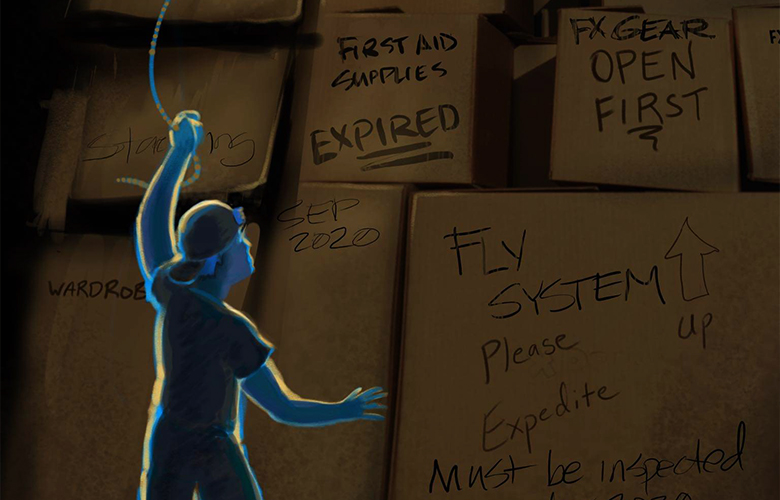In the theater and entertainment world, sometimes inspections are downplayed as interruptions of our work or as costly bureaucratic exercises without benefit to today’s work. Sometimes they are feared as an unwelcome cost with greater expense once flaws are discovered. And sometimes inspections are a welcome review that helps us avoid damage or catastrophe.
As we think through the concept of inspections, we’ll discuss both short and long term uses, how professionals, administrators, and practitioners benefit from their use, and the real reasons we want inspections. We’ll discuss a spectrum surrounding inspections, digging into each aspect so we can all understand that inspections are a tool toward improvement, increased safety, and preserving our gear for the best future. In short, we’ll begin to understand that inspections are good news and to be welcomed.
I am a staff member at a local roadhouse and my theater will have been idle for 13 months by the time I walk back into it. That’s a whole year of deferred maintenance my colleagues and I need to catch up on plus new items we didn’t know about because, well, we’ve been away.
If you’re lucky, your space was idle with the heat and A/C running at nominal, keeping everything stored in a relatively stable storage climate. But maybe not – perhaps someone decided to save money and shut off the climate control completely. Were there other folk in the space – contractors or facilities staff, or the owner (if you lease your space)? Did it get used for another purpose and did they use the gear correctly? Has your gaff tape baked and is no good?
As Benjamin Franklin once said, “An ounce of prevention is worth a pound of cure” so here is an attempt to remind us of all the various items, tools, systems, and gear that we should plan to look over when we restart this machine we call Art. Here’s a list of systems we would have inspected in the past year – had there not been a hiatus – and should plan to inspect soon.
- Purchasing and Suppliers
- How has your organization changed purchasing procedures?
- Have your company P-cards or credit cards expired, or have your limits dropped?
- Are all of your suppliers still in business?
- Has the Point of Contact at the supplier changed?
- How have your suppliers changed their purchase guidelines?
- How have timelines for placing orders changed?
- Has your tax status changed?
- Organization and personnel
- Have any key staffing positions changed?
- Are you still in the same department/ section?
- Are you up to date on your organization’s Equity, Diversity, and Inclusion policies?
- Computers and consoles
- Restart and run software updates and restart software subscriptions
- Contact manufacturer for firmware updates
- Run basic tasks to make sure connectivity functions as it should.
- Have any surge protectors tripped? Find out why
- CHANGE ALL PASSWORDS
- Back-up generators/ UPS/ Surge protectors
- If they have tripped, find out why
- Counterweight fly systems
- Schedule and inspect your motorized line sets
- Move all your manual line sets through their entire (reasonable) range and note their condition
- Look at all of your soft goods even ones in storage, checking for rodent or mold damage
- All non-steel fiber ropes should be visually inspected, especially if they were underweight
- Dead hung battens and light bars
- Check any wall mounted/ affixed lighting bars (usually to make sure anchors are still sound)
- All truss should be checked annually. If it was stored in the air, was it stored properly?
- Ceiling mounted pipe grids should be checked for sound connections, rust, or other defects
- Chain hoists and cable hoists
- Motorized hoists of any sort should be inspected and recertified annually
- Acoustic shells/ towers/ clouds
- Perform or schedule a manufacturer’s recommended inspection of parts and laminates
- Staging
- Check Portable Decking and floors, even though they should be fine
- Risers should be okay depending on how they were stored
- Scene shop power tools
- Check paint, glue, and adhesives for dried out stock and discard
- Check all motors and mechanicals for leaks at hoses, seals, and connectors
- Double check – before using – lubricants on cold saws, metal band saws, drill presses, pneumatic tools, and mills
- Compressor tanks need to be purged and moisture traps emptied. If you have in-line tool lubrication, check that system too
- Clean the paint trap under the sink
- Props kitchen
- Sanitize the refrigerator, stove, and sinks. Run the water until it is clear
- Check for stale food and discard all the ickiness
- Look for signs of rodent and insect intrusions and schedule a service if needed
- Musical Instruments
- Schedule a tuning for the piano(s)
- Service other instruments as needed (strings, organ, percussion)
- Wardrobe/Costume shop tools
- Steamers/ irons may be decalcifying or checking for rust
- Sewing machines/ Sergers will need tuning and lubrication
- Dye vat(s) will need to be checked. So will the sinks, drain traps, and lint filters
- Check makeup supplies, glues, paints, and polishes for dried out stock
- Dye or paint hoods must be tested, have filters replaced also check vent is not obstructed
- Electrics/Lighting gear
- Dimmers and data distribution. Do a firmware/ software upgrade cycle (or two)
- Have any surge protectors tripped?
- Power distribution gear
- Moving lights and followspots
- Anything with fuses or breakers
- Any and all battery powered devices must be recharged or have batteries replaced
- Genies/ lifts
- Emergency lights
- CO2 and smoke detectors
- ClearCom and walkies
- Electronics remotes
- Spotlight scopes (Telrad)
- Effects Gear
- Hazers, Foggers, and snow or bubble machines
- Pyro gear and supplies
- Automation
- Schedule a visit for your pneumatic/ Hydraulic pump systems
- Visually inspect hoses, seals, and fittings both at rest and under pressure
- For all cable drum winches, do a manufacturer recommended inspection
- Physically check all fuses and breakers
- Double check any and all limit switches and E-stops
- Safety Gear
- Careful inspection of Fall Arrest Systems and all components
- Respirators should be re-fit and all cartridges checked
- Air filters (do we have filters in stock? Should we upgrade to better filters?) need examination
- PPE – has any gear aged out like gloves or other supple plastics.
- First Aid Kits/ AED stations must be checked for stale dated supplies. Also, are there post-COVID supplies to include?
- Eye wash stations and emergency showers should be tested and run to clear the water
- Fire Safety System
- Fire Curtains must be run (actually they must be tested every 90 days or every 32 events with public attendees). AND note the test results in your log book.
- Schedule a service visit by your fire extinguisher provider or take your expired fire extinguishers to be re-charged
- Do a test of any rooftop smoke vent doors (should be done every 5 years anyway)
- Ask when the last time your fire detection and alarms were inspected
- Genies, lifts, scaffolding, and ladders
- Schedule a certification visit by your regular service provider
- Physically test all E-stops, rails, safety chains, hoses, and seals
- Company owned vehicles that might have been sitting unused
- Pickup trucks, vans, or company cars
- Forklifts and Material Handlers
- Gas in the tank might be bad – pump out and get new. Properly disposed of old gas
- Check for rodent damage under hood (chewed wires)
- Ventilation and filtration (Central HVAC and portable)
- Contact your HVAC manager and ask about how your vent and filters deal with COVID compliance
- Ask for all filters to be changed before reoccupying the building.
- Ask when your ducts were last cleaned
- Spray booths will need testing and new filters
- Soldering or welding filtration or vents are in good order
- Check that exterior vent port is not obstructed
- Empty the dust collection bins
- Plumbing
- Bleed and sanitize all drinking fountains
- Run all sinks to clear water and refill sink traps
- Flush all toilets
- Pour water into all floor drains
- Re-sanitize all showers
- And others
- Tension Grids should be inspected every 5 years if your state considers them a static installation, otherwise annually
- Catwalks and access areas should be cleaned and looked at for signs of roof leaks and rodent intrusion, and all the excess gear should be taken away
- Schedule a service call for all pit lifts, elevators, escalators
- Do a careful full range move of any motorized, mobile ceilings and electric bridges, checking limit switches and E-stops
- Update the SDS binder
- Add purchased Covid disinfectants
- Remove expired chemicals/paints
- Change all passwords
Have you noticed something missing from this list? Please send suggestions to technicianrights@gmail.com and we’ll continue to update this list.
by Roger Rosvold
Roger Rosvold is a freelance entertainment technician specializing in high quality fabrications and rigging for live performances. Rigging, specifically, is a passion – especially teaching rigging. His experience includes the University of Minnesota, the Utah Shakespearean Festival, the Guthrie Theater, and O’Shaughnessy Auditorium where he currently is the Head Carpenter/Rigger. Between local arena rigging gigs and O’Shaughnessy shows, he teaches for IATSE Local 13 and maintains his ETCP credentials. ON days off, he tends his garden and walks his dog.

Also on TheatreArtLife:



